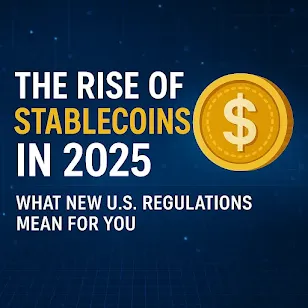The Rise of Stablecoins in 2025: What the New U.S. Regulations Mean for You
Introduction: Why Stablecoins Are Suddenly in the Spotlight
In 2025, stablecoins have become the backbone of global crypto transactions. But what’s drawing even more attention this year is the introduction of the GENIUS Act—a U.S. regulation that reshapes how stablecoins operate. With crypto adoption rising and regulatory frameworks tightening, it’s crucial to understand how these changes impact users, investors, and the broader financial system.
What Are Stablecoins? A Quick Refresher
Stablecoins are digital assets pegged to a stable value, typically a fiat currency like the U.S. dollar (USD). Unlike Bitcoin or Ethereum, which are volatile, stablecoins are designed to maintain price stability.
Popular stablecoins include:
- USDT (Tether)
- USDC (USD Coin)
- DAI
- BUSD (Binance USD)
These coins are widely used for:
- Trading without volatility
- On-ramping/off-ramping into crypto
- Cross-border payments
The GENIUS Act: What It Is and Why It Matters
In June 2025, the U.S. passed the GENIUS Act (Governmental Endorsement of Nationally Issued and Uniform Stablecoins Act). It is the first major federal legislation regulating stablecoins.
Key Features of the GENIUS Act:
- Issuers Must Be Licensed: Only federally approved institutions can issue stablecoins.
- Reserve Backing: All stablecoins must be backed 1:1 by cash or cash-equivalent reserves.
- Transparency Required: Monthly audits are mandatory for issuers to prove backing.
- Consumer Protections: Clear rules around redemption, withdrawal, and insolvency.
- Ban on Algorithmic Stablecoins: Tokens like TerraUSD are not allowed under the act.
How This Impacts You as a Crypto User
Whether you're an investor, trader, or casual user—this regulation affects you directly:
| What You Need to Know | Impact |
|---|---|
| More Trustworthy Coins | USDC and similar regulated coins will likely dominate. |
| Less Risk | Reduces chances of collapse like Terra in 2022. |
| Stricter Onboarding | KYC/AML rules may apply when buying stablecoins. |
| Fewer Algorithmic Options | Decentralized, non-backed stablecoins are being phased out. |
USDC vs Tether: Who Wins Post-Regulation?
USDC (USD Coin)
- Issued by Circle, already aligned with U.S. regulations.
- Full reserves, monthly audits, and strong institutional backing.
- GENIUS Act-compliant — expected to grow in use.
USDT (Tether)
- Largest market cap but has faced controversy over reserve transparency.
- Based offshore (British Virgin Islands).
- May face hurdles if not fully compliant with GENIUS Act standards.
Verdict: USDC is the clear regulatory winner, especially in the U.S. market.
The Bigger Picture: Stablecoins as a Bridge to Global Finance
Stablecoins are no longer just crypto tools—they're becoming global payment instruments. Here's how:
- Cross-Border Payments: Faster and cheaper than SWIFT.
- Retail Payments: Accepted by some major online stores and service platforms.
- CBDC Integration: Could act as intermediaries between users and central bank digital currencies.
The GENIUS Act lays the groundwork for stablecoins to be treated as legitimate financial instruments, which could massively scale adoption across the fintech world.
What to Expect in the Coming Months
- More U.S.-regulated stablecoins from major banks.
- Shifting volume from USDT to USDC and other compliant tokens.
- Global regulatory domino effect, as other countries adopt similar laws.
- DeFi platforms adapting to support only GENIUS-compliant coins.
Conclusion: Why You Should Care About Stablecoin Regulation
In 2025, stablecoins are no longer the Wild West of crypto. With the GENIUS Act now law, these digital dollars are becoming safer, more transparent, and widely accepted. As regulations continue to evolve, smart investors and users will favor compliant and reliable coins—especially in the U.S.
If you’re in crypto, stablecoins are no longer optional—they’re essential.
FAQs:
What is the GENIUS Act and how does it affect stablecoins?
The GENIUS Act, passed in 2025, is a U.S. regulation requiring all stablecoin issuers to be federally licensed, hold 1:1 reserves, and undergo regular audits. It aims to make stablecoins like USDC safer and more transparent for users.
Is USDC safer than Tether (USDT) under new U.S. laws?
Yes, USDC is considered safer under U.S. regulations due to its full reserve backing, transparency, and compliance with the GENIUS Act. Tether (USDT), while widely used, faces more regulatory scrutiny due to offshore operations and past controversies.
Can I still use algorithmic stablecoins like DAI or TerraUSD in 2025?
Under the GENIUS Act, algorithmic stablecoins without full fiat backing (like TerraUSD) are banned in the U.S. However, decentralized coins like DAI may still be used if they meet compliance standards and transparency requirements.


0 Comments